
events
past events
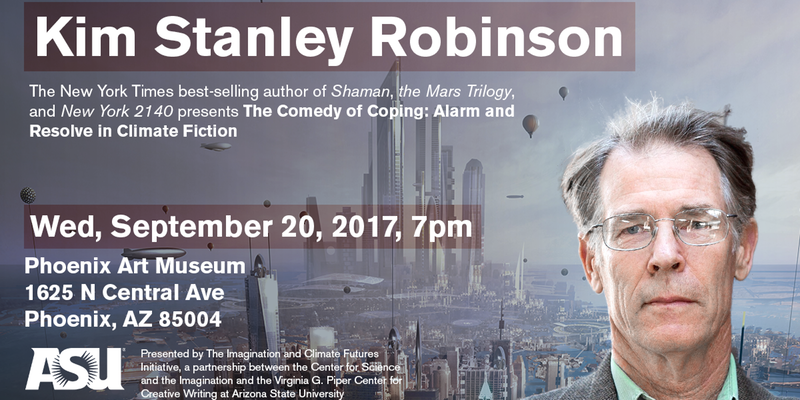
The Comedy of Coping, with Kim Stanley Robinson
As the creeping destruction wrought by climate change escalates and political antagonism and public apathy deepen, finding the right story to catalyze change is more urgent than ever. Join ASU’s Imagination and Climate Futures Initiative for a talk with New York Times-bestselling author Kim Stanley Robinson, “The Comedy of Coping: Alarm and Resolve in Climate Fiction” on Wednesday, September 20, 2017 at the Phoenix Art Museum at 7:00 pm. After the talk, Robinson will take questions from the audience and sign books. This event is open to the public and free. In the talk, Robinson will trace the threads of story and science that he wove together to create his latest novel, New York 2140, a scientifically-grounded exploration of climate chaos, its long aftermath, and the enduring forces of culture and community. He will also argue that we need to renounce apocalyptic thinking, even when it feels most irresistible. What can stories do in the face of impending calamity? How can fiction authors balance their urges to unsettle and inspire? How can literature be part of an affirmative response to existential risk?
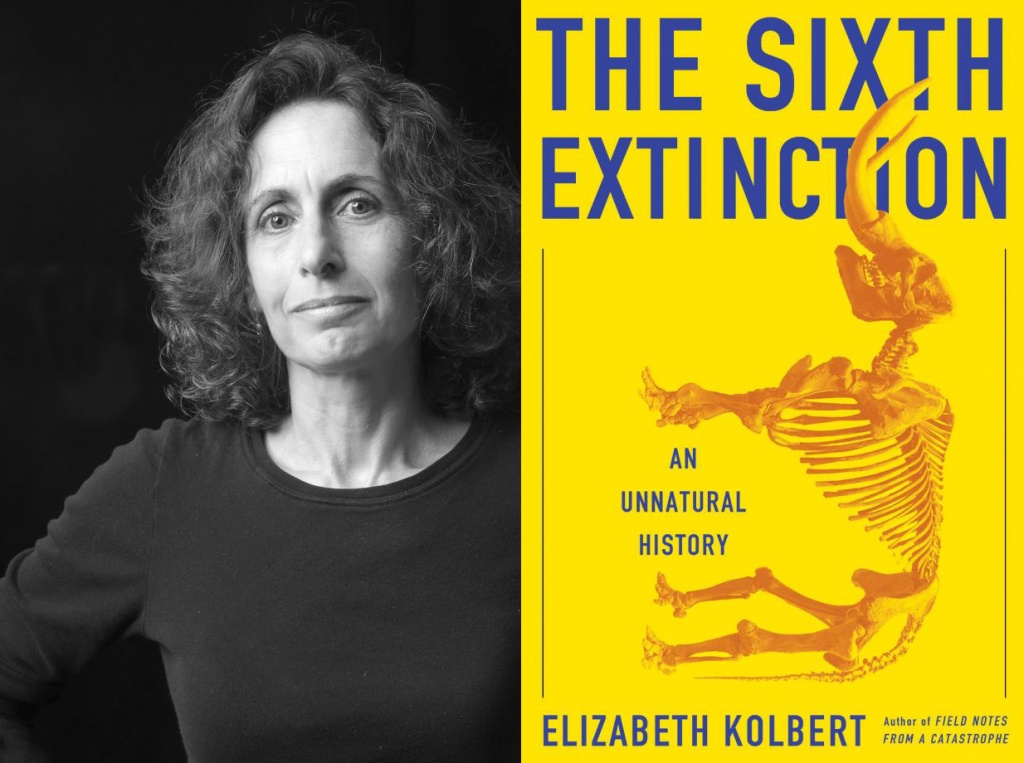
Elizabeth Kolbert lecture
Over the last half-billion years, there have been five mass extinctions. Scientists around the world are currently monitoring the sixth extinction, predicted to be the most devastating extinction event since the asteroid impact that wiped out the dinosaurs – the first extinction. This time around, the cataclysm is us. Join Pulitzer-prize winning author and journalist Elizabeth Kolbert for a special presentation on her latest work, The Sixth Extinction: An Unnatural History. In this exclusive lecture, Ms. Kolbert will demonstrate how human beings have altered life on the planet in a way that no species has and how the sixth extinction is likely to be mankind’s most lasting legacy. Blending natural history, scientific analysis and reporting from the field into a richly detailed narrative, Kolbert takes an abstract ecological crisis and makes it real, compelling us to rethink our ideas about responsibility, agency and what it means to be human. Thursday, October 20, 2016 at 7p.m. Tempe Center for the Arts 700 W. Rio Salado Pkwy Free and open to the public Book signing and a public reception will follow the lecture. Register Now Elizabeth Kolbert has been a staff writer for The New Yorker since 1999. Her work has appeared in The New York Times Magazine, Vogue, and Mother Jones, and has been anthologized in The Best American Science and Nature Writing and The Best American Political Writing. Her latest work, The Sixth Extinction: An Unnatural History, won the 2015 Pulitzer Prize in General Nonfiction, was a New York Times 2014 Top Ten Best Book of the Year, and was a finalist for the National Book Critics Circle awards for the best books of 2014.

WORKSHOP: IMAGINATION AS A RESEARCH CHALLENGE – A Methods Workshop
Imagination research presents significant methodological challenges that cross disciplinary boundaries. The Imagination and Climate Futures Initiative (ICF) is hosting a workshop to initiate an inclusive, interdisciplinary discussion at ASU to explore and push the methodological boundaries of imagination research. Scholars in various disciplines define and study imagination differently, bringing their specific disciplinary lenses and tools to bear on this multifaceted phenomenon. This workshop will bring together scholars and methods experts from a range of different disciplines to explore methodological challenges and novel multi-methods approaches to studying both cognitive and social processes of imagination. With this event we seek to initiate an ongoing interdisciplinary conversation about methods in imagination research with the ultimate aim to advance knowledge production about imagination, in particular imagination as it relates to the future.
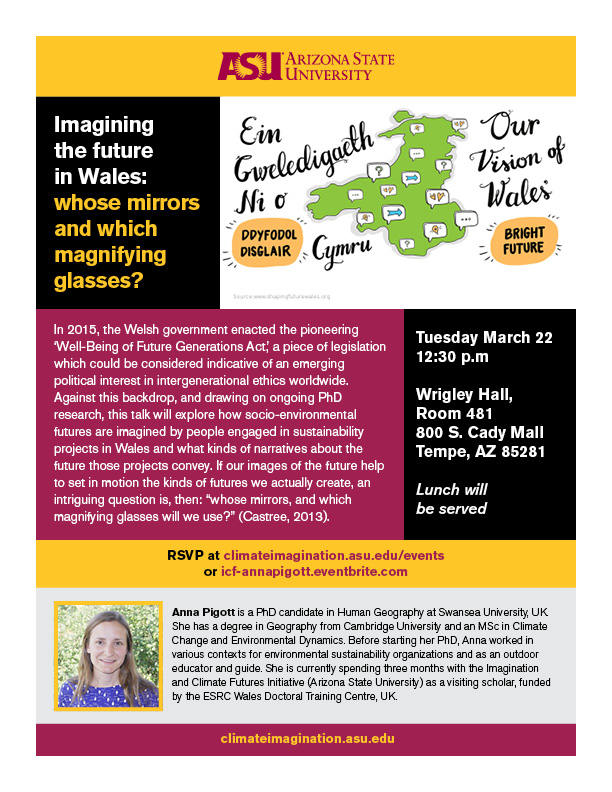
Imagining the future in Wales: whose mirrors and which magnifying glasses?
In 2015, the Welsh government enacted the pioneering ‘Well-Being of Future Generations Act,’ a piece of legislation which could be considered indicative of an emerging political interest in intergenerational ethics worldwide. Against this backdrop, and drawing on ongoing PhD research, this talk will explore how socio-environmental futures are imagined by people engaged in sustainability projects in Wales and what kinds of narratives about the future those projects convey. If our images of the future help to set in motion the kinds of futures we actually create, an intriguing question is, then: “whose mirrors, and which magnifying glasses will we use?” (Castree, 2013). Anna Pigott is a PhD candidate in Human Geography at Swansea University, UK. She has a degree in Geography from Cambridge University and an MSc in Climate Change and Environmental Dynamics. Before starting her PhD, Anna worked in various contexts for environmental sustainability organizations and as an outdoor educator and guide. She is currently spending three months with the Imagination and Climate Futures Initiative (Arizona State University) as a visiting scholar, funded by the ESRC Wales Doctoral Training Centre, UK.
Covering Climate Change: Past, Present and Future
Panel:Andy Revkin- Science and Environment reporter for New York Times, AuthorRichard Harris- Climate Change Reporter for National Public Radio, Visiting Scholar at ASU, AuthorManjana Milkoreit- Post-doctoral Research Fellow and Senior Sustainability Fellow at the Julie Ann Wrigley Global Institute of Sustainability at ASU Moderator:Daniel Sarewitz – professor of science and society in the School for the Future of Innovation in SocietyDirector the Washington D.C. office of the Consortium for Science, Policy and Outcomes. Climate change isn’t just a challenge for science and policy — it’s also a challenge for journalists and other writers. The way that we understand climate change has been strongly shaped by journalists; and the way we imagine the future of climate change is also being shaped by the stories we tell about it. How well has our media covered climate change? How has media coverage influenced social and political response? How have society and politics influence the media? How can the stories we tell about climate change help us confront and manage the complexities of this phenomena on a planet increasingly influenced by human activity? Tuesday, January 12, 2016 from 1:00-2:30pm You can watch a recording of the panel discussion here or read The power of words: Climate change and the media.
Case Critical: Postcards from Paris
Panel:Manjana Milkoreit- Post-doctoral Research Fellow and Senior Sustainability Fellow at the Julie Ann Wrigley Global Institute of Sustainability at ASUJeffrey Swofford – PhD Student, School of SustainabilityDaniel Bodansky – Foundation Professor of Law, Sandra Day O’Connor College of Law; Faculty Co-Director, Center for Law and Global AffairsSonja Klinsky – Senior Sustainability Scientist and Assistant Professor at the School of Sustainability In December 2015, governments of the world met in Paris and adopted an arguably game-changing international agreement on climate change. In this Case-Critical discussion, four ASU experts who attended the historic climate negotiations discuss what happened at COP21, what they were doing while they were there, what they consider to be the innovations of the Paris agreement, and what the agreement implies for the US and the world. What might ASU staff, students and faculty contribute as all parties move forward Follow ASU’s page dedicated to the COP 21 for more information about the ASU experts who participated at COP21. Co-sponsored by the Center for Law and Global Affairs, Sandra Day O’Connor College of Law. Wednesday, January 20, 2016
Imagination and Climate Change – Cognitive Skills for Complex Problem Solving and Transformational Change
As part of the 2015 Conference on Complex Systems at Arizona State University, the Imagination and Climate Futures Initiative hosted a full-day workshop on Imagination and Climate Change – Cognitive Skills for Complex Problem Solving and Transformational Change on October 1st, 2015. The workshop explored multiple ways in which imagination processes are part of, contribute to and shape processes of social transformation. Creative activities, including a Book Sprint on imagination and a story-development game – Eventuality – generated new perspectives and ideas. Conference on Complex SystemsArizona State UniversitySeptember 28 – October 2, 2015 Download the Call for Papers or Participation
Climate Fiction – Science, Stories or Seeds of Transformation?
Internationally renowned award winning authors like Margaret Atwood, Paolo Bacigalupi and Ian McEwan are turning to the emerging literary genre of Climate Fiction – or Cli-Fi – to tell stories set in a climatically changed world. On April 2nd, 2015 the Imagination and Climate Futures Initiative invited the ASU community and the public to a panel discussion on Cli-Fi, exploring the nature and roots of the genre and its societal influence beyond simply telling stories. Can a Cli-Fi story trigger a social movement? Does it offer science lessons? Could a book change politics or societies? How? Making the event interactive, we engaged attendees in a short climate flash fiction exercise, asking them to do some on-the-spot Cli-Fi storytelling. You can find out more about the activity and its impressive results here. A summary of the event can be found here. The Panel: Joni AdamsonProfessor of English and Environmental Humanities, ASU Department of EnglishSenior Sustainability Scholar, Julie Ann Wrigley Global Institute of Sustainability Clark MillerAssociate Director, Consortium for Science, Policy & OutcomesSenior Sustainability Scientist, Julie Ann Wrigley Global Institute of Sustainability Sydney LinesASU LightWorks Communications Program Coordinator Manjana MilkoreitPostdoctoral Research Fellow, Walton Sustainability Solutions Initiatives Missed the panel? Watch now
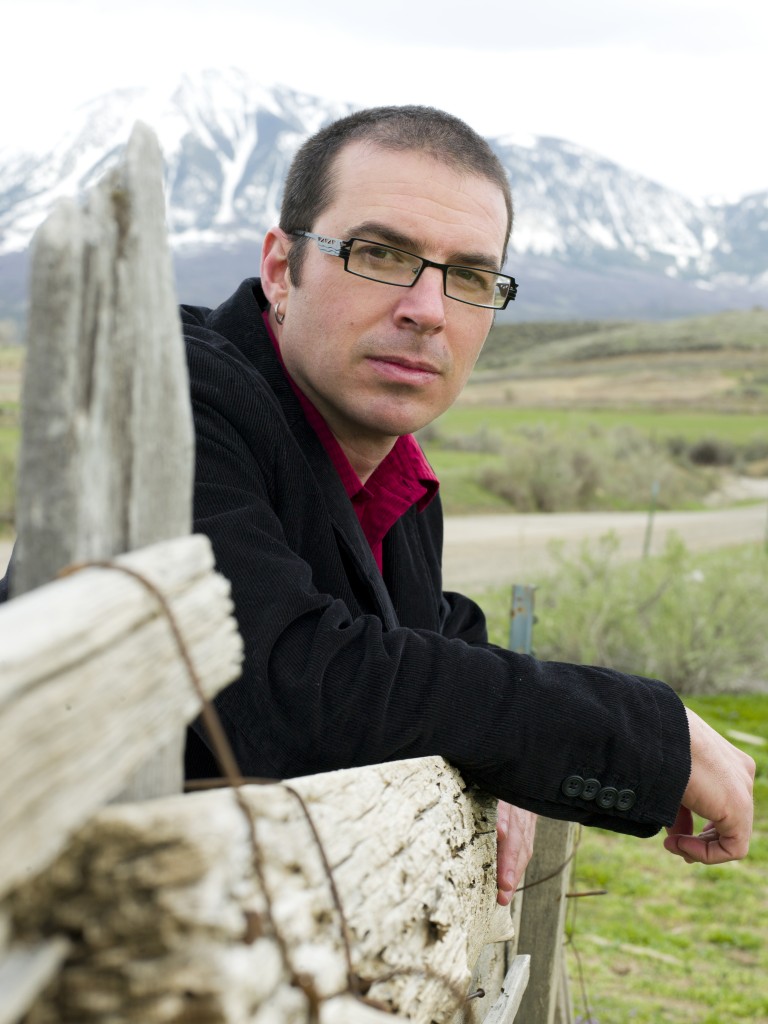
Paolo Bacigalupi: The Imagination Drought: Speculative Fiction as a Tool of Warning and Empowerment
In Paolo Bacigalupi’s most recent science fiction novel, “The Water Knife,” Phoenix is dried up and California and Nevada are not too far behind. The millions of people who rely on the Colorado River to survive are not only thirsty, but fighting for their lives. It’s a compelling story that captures a not-so-distant future. Will Phoenix eventually collapse? Will the river dry up? In September 2015, New York Times-bestselling author Paolo Bacigalupi visited ASU to discuss “The Water Knife,” and the future of the Colorado River as part of ASU’s Imagination and Climate Futures Initiative. Paolo gave a public lecture at the Tempe Center for the Arts, spoke with students and faculty of the Virginia G. Piper Center for Creative Writing, and participated a workshop on Art, Science and Imagination – Developing Transdisciplinary Research & Teaching to Shape the Future. You can read about Paolo’s talk here: Deliberate Dystopias: Uncovering our climate futures with Paolo Bacigalupi.
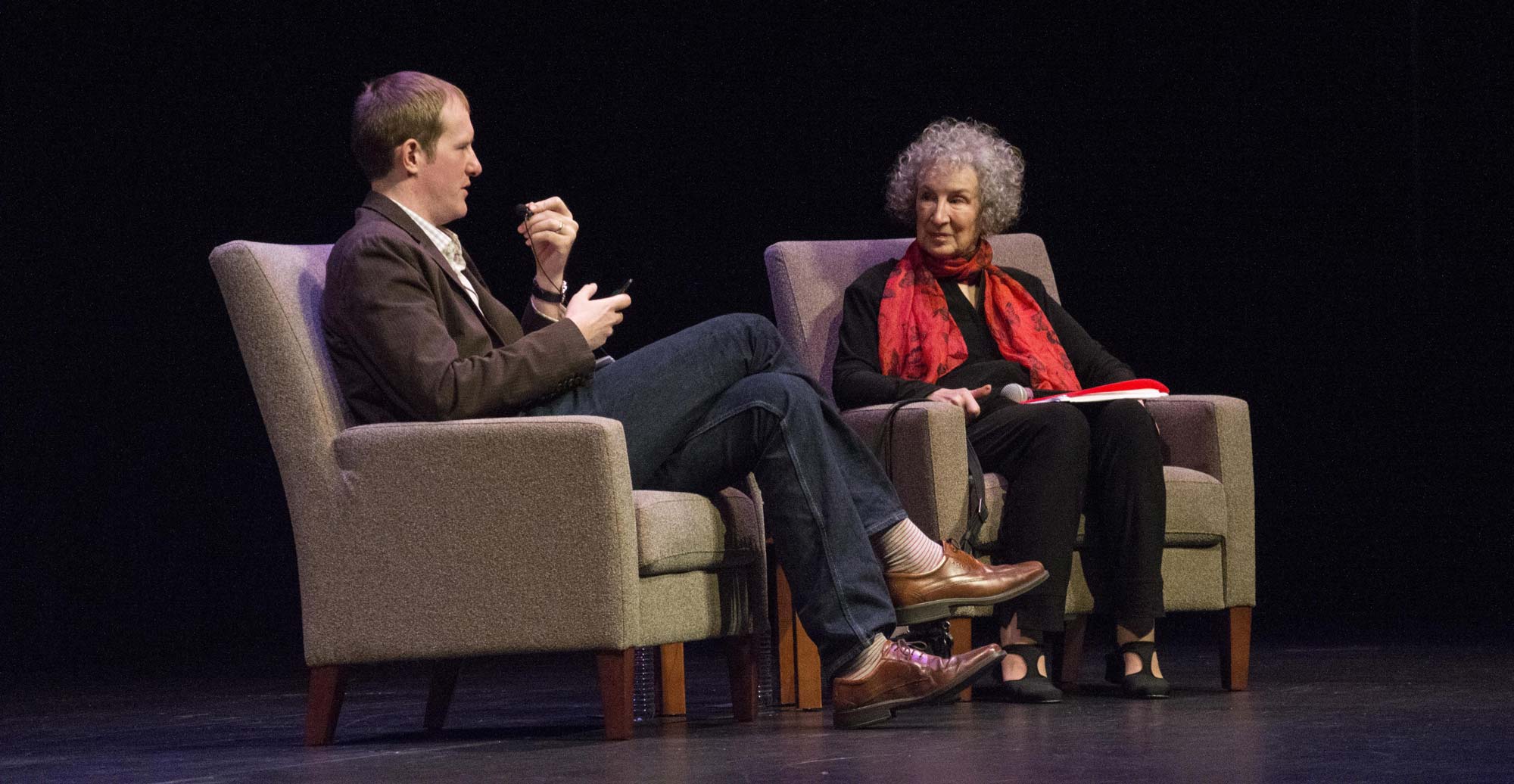
Margaret Atwood at ASU
In November 2014, award-winning author Margaret Atwood visited Arizona State University to visit with students, faculty and researcher and present the inaugural lecture of ASU’s Imagination and Climate Futures Initiative: MaddAddam – A Guide to the Future?. Combining wit, wisdom and humor, Atwood spoke about imagination, science and stories about the future in a time of “the everything change.” On the Tempe campus, Atwood participated in a workshop with ASU researchers on Art, Science and Imagination – Developing Transdisciplinary Research to Shape the Future that discussed innovative project ideas for strengthening society’s ability to engage with the future. She also met with MFA students, faculty and staff of the Virginia G. Piper Center for Creative Writing. The Slate Interview: Ed Finn, director of ASU’s Center for Science and the Imagination, sat down with Atwood for an extended conversation about her views of the future and the genre known as Cli-Fi. https://player.vimeo.com/video/118071435